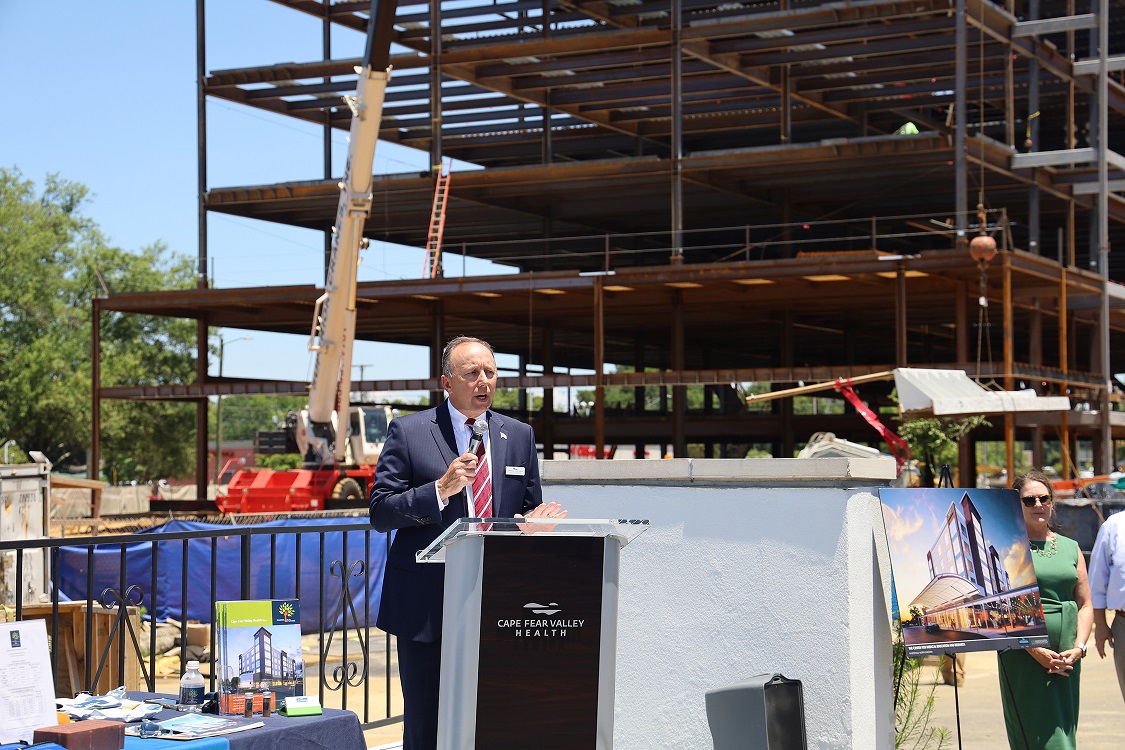
As Cape Fear Valley Health’s (CFVH) new Center for Medical Education takes shape, health care leaders continue to stress its vital role in meeting the area’s longterm medical needs.
With North Carolina facing a physician shortage, officials say one of the best ways to attract new doctors is having “robust centers for education and training as they begin their careers.”
After completing four years of medical school, aspiring physicians earn the title “doctor,” but their education is far from over. Before they can practice unsupervised, medical school graduates must complete a residency.
A local hospital with a residency program not only benefits new doctors, it’s a valuable asset for the community, officials say, serving as a pipeline of new providers. According to the Association of American Medical Colleges, more than half of all physicians go into practice within 50 miles of their residency.
“The new Center for Medical Education will attract hundreds of new doctors to serve our region and ensure that our community always has the care we need, right here where we live and work,” Tammy Thurman said last week during a symbolic “topping off” ceremony for the five-story building, which will include lecture halls, classrooms and labs for Cape Fear’s growing residency program.

Thurman is a member of the Cape Fear Valley Health Foundation’s Caring for the Future campaign, which is raising $3 million needed to complete the $31 million project. Donations from Campbell University, The Duke Endowment, the Thomas R. and Elizabeth E. McLean Foundation, Cape Fear Valley Volunteer Auxiliary and others have covered 75% of the cost.
In 2017, Cape Fear partnered with the Campbell University medical school to begin the residency program.
“In just three years, our residency program has grown to include over 170 residents training in nine different program areas, as well as 110 medical students,” according to Dr. Donald Maharty, vice president of medical education at CFVH. “Simply put, we are bursting at the seams.”
The medical-education program is being implemented in two phases: Phase One residencies include obstetrics and gynecology, internal medicine, emergency medicine, psychiatry, cardiology, general surgery, podiatry and pharmacy. Phase Two will add additional areas, potentially including anesthesiology, orthopedics, neurology and ENT. Specialty fellowship training in cardiology, critical care and child and adolescent psychiatry also are planned.
The Center for Medical Education will provide space to train up to 300 residents, nearly doubling the size of the current program, CFVH officials said. The center also will house a planned Neuroscience Institute, which will provide specialty care as well as research related to strokes, brain tumors and traumatic brain injuries, among other neurological issues,
As the program grows, officials say, so should the number of new, highly trained doctors practicing in the region. (Half of the first classes of residents already have signed on to work in the Cape Fear Valley Health system.)
“We’re building this facility and these programs for our community, because we want to welcome and train a first-class physician workforce who are ready and confident to step out into the world, but who are just as likely to stay right here,” Cape Fear Valley CEO Michael Nagowski Nagowski said.
“The Residency Program is a real game changer for Cape Fear Valley Health and for this region. The impact on our health system, our community, and our economy simply cannot be overstated.”
The facility is expected to open in summer 2022, in time to welcome a new class of residents, a spokesperson for CFVH said.

Cookout season is officially in full swing, and if you’re tired of grilling your own, the Haymount Truck Stop has an exciting option for the whole family! The Truck Stop’s inaugural burger competition is happening on Saturday, July 19.

Adiós. Au revoir. Auf Wiedersehen.No, I am not leaving the Greater Fayetteville Business Journal, but I am going on a long overdue vacation!Hello dear readers, this is my roundabout way of announcing to the community that starting on July 4, any and

In a city where traditional lending channels can overlook aspiring business owners from underserved communities, the Tulsa Initiative is changing the narrative around access to capital. The Fayetteville-based nonprofit has worked to expand its missio